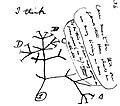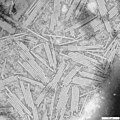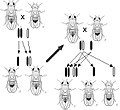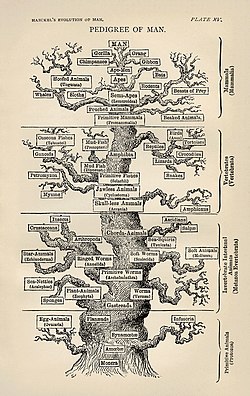Portal:Biology
Introduction


Biology is the scientific study of life. It is a natural science with a broad scope but has several unifying themes that tie it together as a single, coherent field. For instance, all organisms are composed of at least one cell that processes hereditary information encoded in genes, which can be transmitted to future generations. Another major theme is evolution, which explains the unity and diversity of life. Energy processing is also important to life as it allows organisms to move, grow, and reproduce. Finally, all organisms can regulate their own internal environments.
Biologists can study life at multiple levels of organization, from the molecular biology of a cell to the anatomy and physiology of plants and animals, and the evolution of populations. Hence, there are multiple subdisciplines within biology, each defined by the nature of their research questions and the tools that they use. Like other scientists, biologists use the scientific method to make observations, pose questions, generate hypotheses, perform experiments, and form conclusions about the world around them.
Life on Earth, which emerged over 3.7 billion years ago, is immensely diverse. Biologists have sought to study and classify the various life form, from prokaryotic organisms such as archaea and bacteria to eukaryotic organisms such as protists, fungi, plants, and animals. These organisms contribute to the biodiversity of an ecosystem, where they play specialized roles in the cycling of nutrients and energy through their biophysical environment. (Full article...)
Selected article -
In biology, taxonomy (from Ancient Greek τάξις (taxis) 'arrangement' and -νομία (-nomia) 'method') is the scientific study of naming, defining (circumscribing) and classifying groups of biological organisms based on shared characteristics. Organisms are grouped into taxa (singular: taxon), and these groups are given a taxonomic rank; groups of a given rank can be aggregated to form a more inclusive group of higher rank, thus creating a taxonomic hierarchy. The principal ranks in modern use are domain, kingdom, phylum (division is sometimes used in botany in place of phylum), class, order, family, genus, and species. The Swedish botanist Carl Linnaeus is regarded as the founder of the current system of taxonomy, as he developed a ranked system known as Linnaean taxonomy for categorizing organisms.
With advances in the theory, data and analytical technology of biological systematics, the Linnaean system has transformed into a system of modern biological classification intended to reflect the evolutionary relationships among organisms, both living and extinct. (Full article...)
Selected picture -

An embryo is a multicellular diploid eukaryote in its earliest stage of development, from the time of first cell division until birth, hatching, or germination. In humans, it is called an embryo until about eight weeks after fertilization (i.e. ten weeks after the last menstrual period or LMP)
Major topics
Selected biography -

Edavalath Kakkat Janaki Ammal (formally known as Janaki Ammal) (4 November 1897 – 7 February 1984) was an Indian botanist who worked on plant breeding, cytogenetics and phytogeography. Her most notable work involved studies on sugarcane and the eggplant (brinjal). She also worked on the cytogenetics of a range of plants and co-authored the Chromosome Atlas of Cultivated Plants (1945) with C.D. Darlington. She took an interest in ethnobotany and plants of medicinal and economic value from the rain forests of Kerala, India. She was awarded Padma Shri in 1977. (Full article...)
General images -
Did you know -
- ... that endemics along the wildlife of Morocco include more than six hundred species of vascular plants and a single species of bird?
- ... that an extract of Alchemilla diademata, a plant endemic to Lebanon, shows antimicrobial activity against Staphylococcus aureus?
- ... that more than 5,000 hen fleas were recorded from the nest of a coal tit?
Things you can do
Related portals
Biology portals
Categories

Anatomy - Anthropology - Astrobiology - Biochemistry - Bioengineering - Bioinformatics - Biotechnology - Botany - Cell biology - Conservation biology - Developmental biology - Ecology - Environmental science - Evolutionary biology - Genetics - Mathematical biology - Medicine - Microbiology - Immunology - Molecular biology - Mycology - Neuroscience - Paleontology - Palynology Parasitology - Pharmacology -
Phylogenetics - Physiology - Systems biology - Taxonomy - Toxicology - Virology - ZoologyMore topics
WikiProjects

WikiProjects connected with biology:
A complete list of scientific WikiProjects can be found here. See also Wikispecies, a Wikimedia project dedicated to classification of biological species.
Associated Wikimedia
The following Wikimedia Foundation sister projects provide more on this subject:
-
Commons
Free media repository -
Wikibooks
Free textbooks and manuals -
Wikidata
Free knowledge base -
Wikinews
Free-content news -
Wikiquote
Collection of quotations -
Wikisource
Free-content library -
Wikiversity
Free learning tools -
Wiktionary
Dictionary and thesaurus

























































